Commercial and Corporation Law Assignment: Analysis of Legal Issues
VerifiedAdded on 2023/01/05
|9
|2461
|25
Homework Assignment
AI Summary
This document presents a comprehensive solution to a commercial and corporation law assignment, addressing four key questions. The first question examines the enforceability of a Heads of Agreement, analyzing the principles established in Masters v Cameron (1954) to determine whether a binding contract existed between Tina and Jeff. The second question delves into director's duties and the business judgment rule under the Corporations Act 2001, assessing the potential personal liability of Phil and Robert for an unpaid debt. The third question explores agency law, focusing on whether Allan can enforce a contract against Francis, considering the authority of an agent under the Corporation Act and the Fair Trading Act 1999. The final question assesses the potential legal actions Prue can take against various parties for damages, considering the duty of care and relevant legislation like the Civil Liability Act 2003. Each question includes detailed legal analysis, application of relevant case law, and conclusions to provide a complete understanding of the legal principles involved.
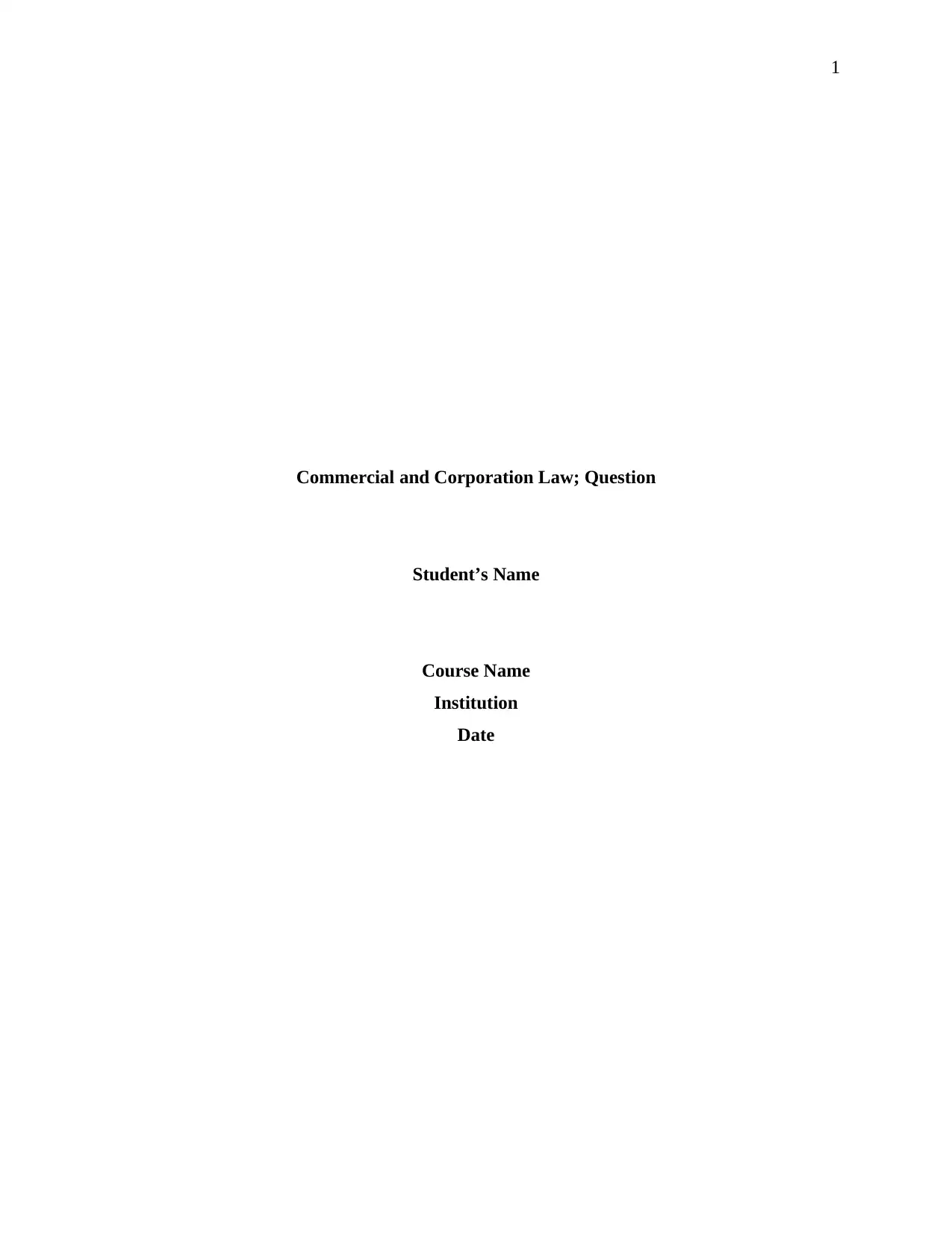
1
Commercial and Corporation Law; Question
Student’s Name
Course Name
Institution
Date
Commercial and Corporation Law; Question
Student’s Name
Course Name
Institution
Date
Paraphrase This Document
Need a fresh take? Get an instant paraphrase of this document with our AI Paraphraser
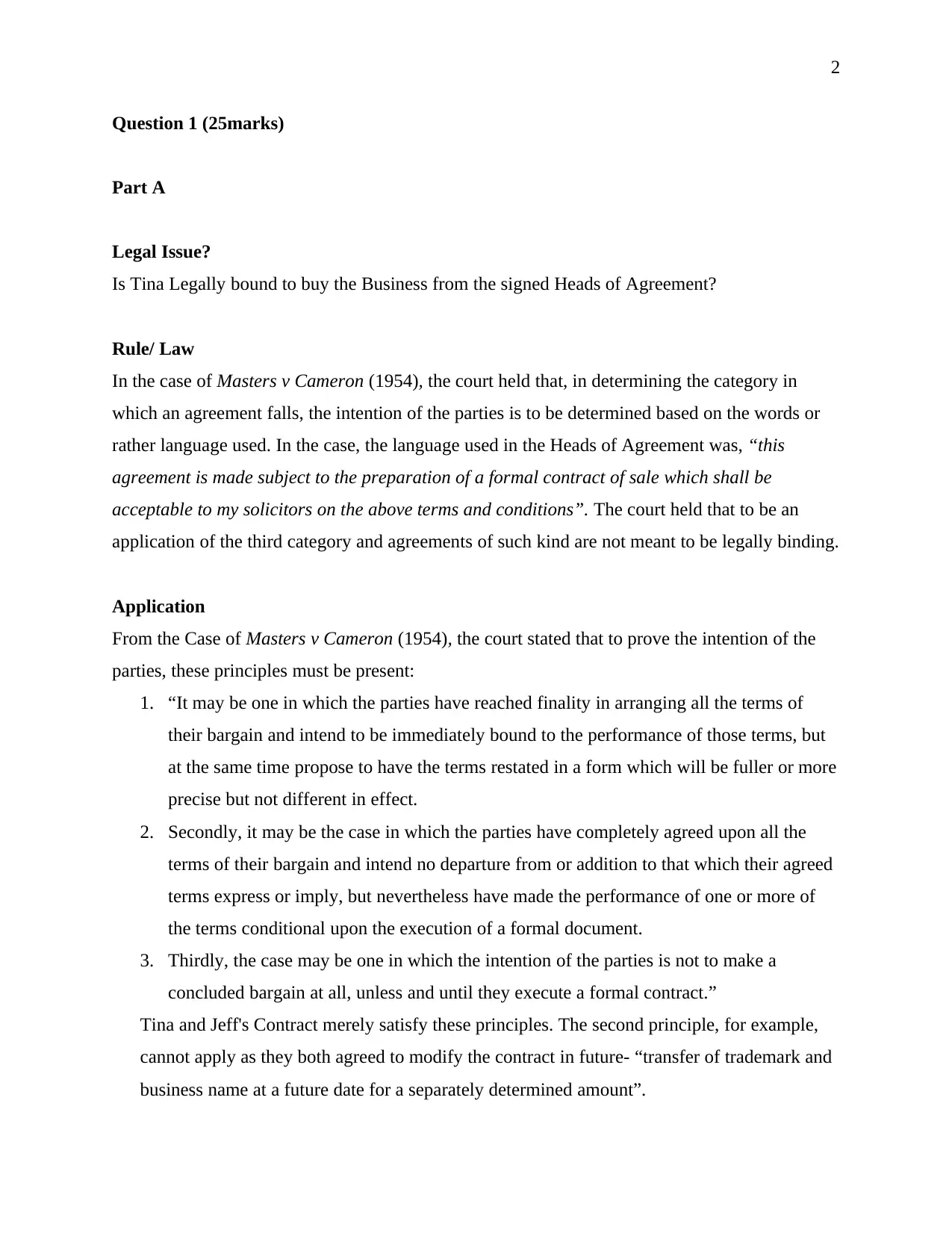
2
Question 1 (25marks)
Part A
Legal Issue?
Is Tina Legally bound to buy the Business from the signed Heads of Agreement?
Rule/ Law
In the case of Masters v Cameron (1954), the court held that, in determining the category in
which an agreement falls, the intention of the parties is to be determined based on the words or
rather language used. In the case, the language used in the Heads of Agreement was, “this
agreement is made subject to the preparation of a formal contract of sale which shall be
acceptable to my solicitors on the above terms and conditions”. The court held that to be an
application of the third category and agreements of such kind are not meant to be legally binding.
Application
From the Case of Masters v Cameron (1954), the court stated that to prove the intention of the
parties, these principles must be present:
1. “It may be one in which the parties have reached finality in arranging all the terms of
their bargain and intend to be immediately bound to the performance of those terms, but
at the same time propose to have the terms restated in a form which will be fuller or more
precise but not different in effect.
2. Secondly, it may be the case in which the parties have completely agreed upon all the
terms of their bargain and intend no departure from or addition to that which their agreed
terms express or imply, but nevertheless have made the performance of one or more of
the terms conditional upon the execution of a formal document.
3. Thirdly, the case may be one in which the intention of the parties is not to make a
concluded bargain at all, unless and until they execute a formal contract.”
Tina and Jeff's Contract merely satisfy these principles. The second principle, for example,
cannot apply as they both agreed to modify the contract in future- “transfer of trademark and
business name at a future date for a separately determined amount”.
Question 1 (25marks)
Part A
Legal Issue?
Is Tina Legally bound to buy the Business from the signed Heads of Agreement?
Rule/ Law
In the case of Masters v Cameron (1954), the court held that, in determining the category in
which an agreement falls, the intention of the parties is to be determined based on the words or
rather language used. In the case, the language used in the Heads of Agreement was, “this
agreement is made subject to the preparation of a formal contract of sale which shall be
acceptable to my solicitors on the above terms and conditions”. The court held that to be an
application of the third category and agreements of such kind are not meant to be legally binding.
Application
From the Case of Masters v Cameron (1954), the court stated that to prove the intention of the
parties, these principles must be present:
1. “It may be one in which the parties have reached finality in arranging all the terms of
their bargain and intend to be immediately bound to the performance of those terms, but
at the same time propose to have the terms restated in a form which will be fuller or more
precise but not different in effect.
2. Secondly, it may be the case in which the parties have completely agreed upon all the
terms of their bargain and intend no departure from or addition to that which their agreed
terms express or imply, but nevertheless have made the performance of one or more of
the terms conditional upon the execution of a formal document.
3. Thirdly, the case may be one in which the intention of the parties is not to make a
concluded bargain at all, unless and until they execute a formal contract.”
Tina and Jeff's Contract merely satisfy these principles. The second principle, for example,
cannot apply as they both agreed to modify the contract in future- “transfer of trademark and
business name at a future date for a separately determined amount”.
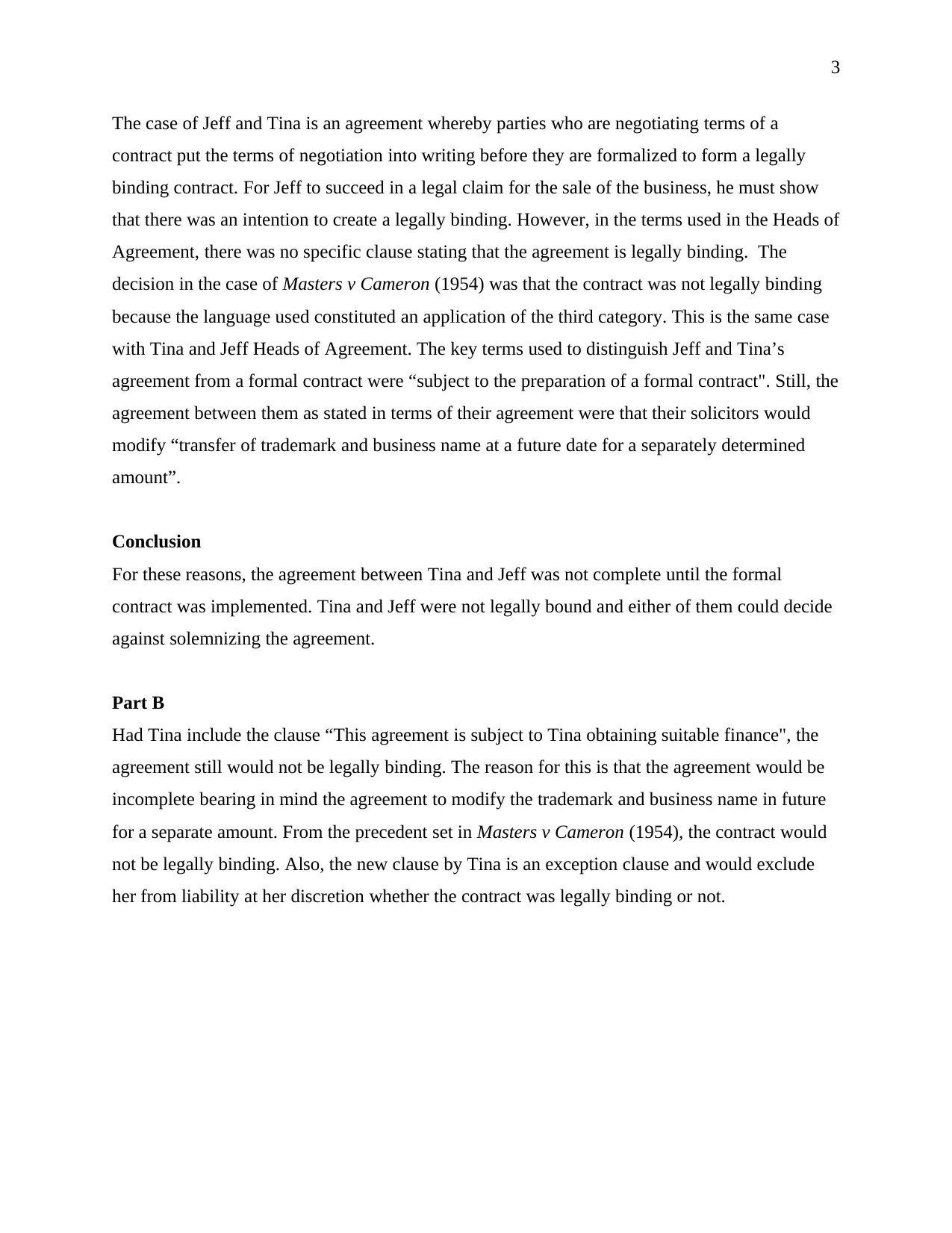
3
The case of Jeff and Tina is an agreement whereby parties who are negotiating terms of a
contract put the terms of negotiation into writing before they are formalized to form a legally
binding contract. For Jeff to succeed in a legal claim for the sale of the business, he must show
that there was an intention to create a legally binding. However, in the terms used in the Heads of
Agreement, there was no specific clause stating that the agreement is legally binding. The
decision in the case of Masters v Cameron (1954) was that the contract was not legally binding
because the language used constituted an application of the third category. This is the same case
with Tina and Jeff Heads of Agreement. The key terms used to distinguish Jeff and Tina’s
agreement from a formal contract were “subject to the preparation of a formal contract". Still, the
agreement between them as stated in terms of their agreement were that their solicitors would
modify “transfer of trademark and business name at a future date for a separately determined
amount”.
Conclusion
For these reasons, the agreement between Tina and Jeff was not complete until the formal
contract was implemented. Tina and Jeff were not legally bound and either of them could decide
against solemnizing the agreement.
Part B
Had Tina include the clause “This agreement is subject to Tina obtaining suitable finance", the
agreement still would not be legally binding. The reason for this is that the agreement would be
incomplete bearing in mind the agreement to modify the trademark and business name in future
for a separate amount. From the precedent set in Masters v Cameron (1954), the contract would
not be legally binding. Also, the new clause by Tina is an exception clause and would exclude
her from liability at her discretion whether the contract was legally binding or not.
The case of Jeff and Tina is an agreement whereby parties who are negotiating terms of a
contract put the terms of negotiation into writing before they are formalized to form a legally
binding contract. For Jeff to succeed in a legal claim for the sale of the business, he must show
that there was an intention to create a legally binding. However, in the terms used in the Heads of
Agreement, there was no specific clause stating that the agreement is legally binding. The
decision in the case of Masters v Cameron (1954) was that the contract was not legally binding
because the language used constituted an application of the third category. This is the same case
with Tina and Jeff Heads of Agreement. The key terms used to distinguish Jeff and Tina’s
agreement from a formal contract were “subject to the preparation of a formal contract". Still, the
agreement between them as stated in terms of their agreement were that their solicitors would
modify “transfer of trademark and business name at a future date for a separately determined
amount”.
Conclusion
For these reasons, the agreement between Tina and Jeff was not complete until the formal
contract was implemented. Tina and Jeff were not legally bound and either of them could decide
against solemnizing the agreement.
Part B
Had Tina include the clause “This agreement is subject to Tina obtaining suitable finance", the
agreement still would not be legally binding. The reason for this is that the agreement would be
incomplete bearing in mind the agreement to modify the trademark and business name in future
for a separate amount. From the precedent set in Masters v Cameron (1954), the contract would
not be legally binding. Also, the new clause by Tina is an exception clause and would exclude
her from liability at her discretion whether the contract was legally binding or not.
⊘ This is a preview!⊘
Do you want full access?
Subscribe today to unlock all pages.

Trusted by 1+ million students worldwide
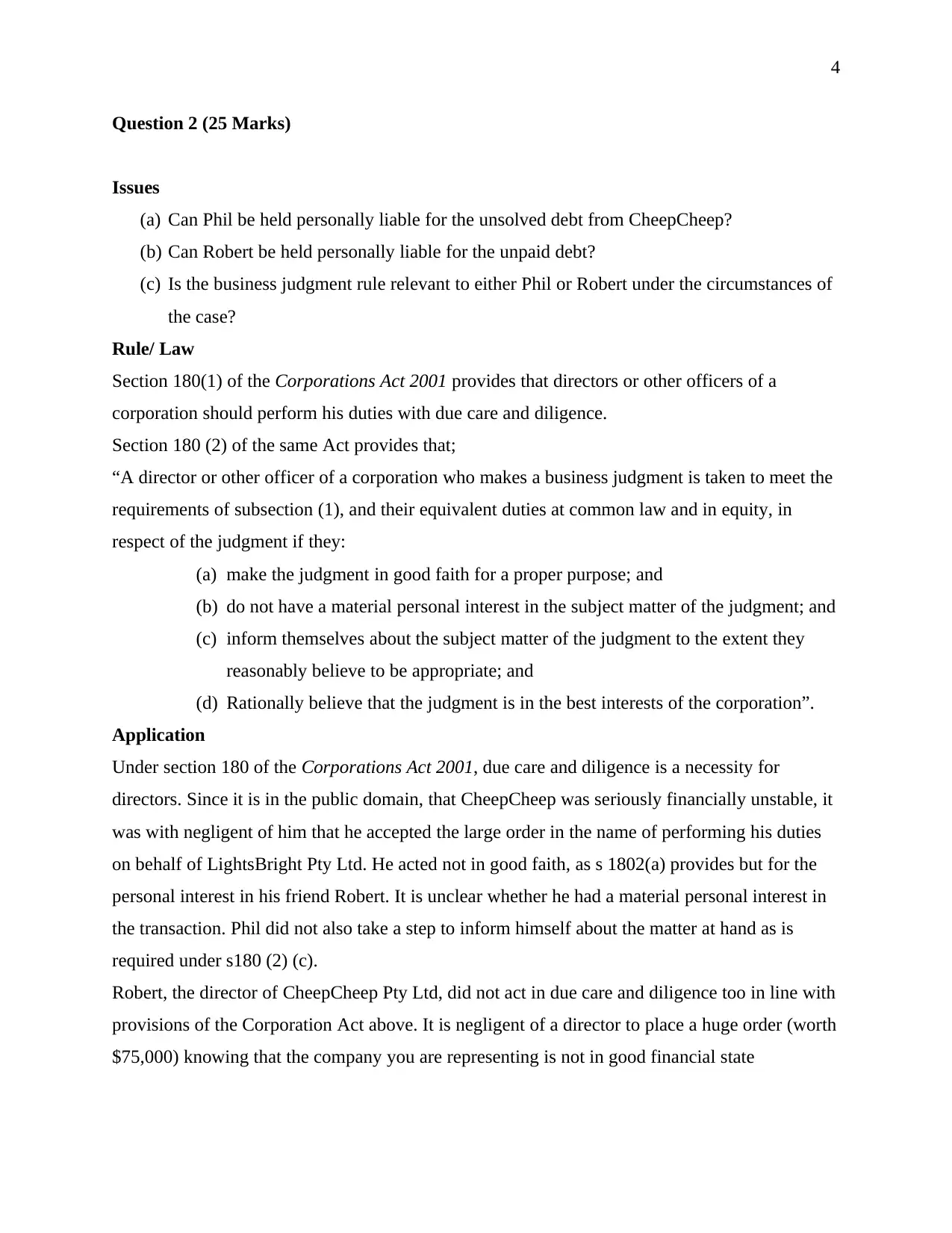
4
Question 2 (25 Marks)
Issues
(a) Can Phil be held personally liable for the unsolved debt from CheepCheep?
(b) Can Robert be held personally liable for the unpaid debt?
(c) Is the business judgment rule relevant to either Phil or Robert under the circumstances of
the case?
Rule/ Law
Section 180(1) of the Corporations Act 2001 provides that directors or other officers of a
corporation should perform his duties with due care and diligence.
Section 180 (2) of the same Act provides that;
“A director or other officer of a corporation who makes a business judgment is taken to meet the
requirements of subsection (1), and their equivalent duties at common law and in equity, in
respect of the judgment if they:
(a) make the judgment in good faith for a proper purpose; and
(b) do not have a material personal interest in the subject matter of the judgment; and
(c) inform themselves about the subject matter of the judgment to the extent they
reasonably believe to be appropriate; and
(d) Rationally believe that the judgment is in the best interests of the corporation”.
Application
Under section 180 of the Corporations Act 2001, due care and diligence is a necessity for
directors. Since it is in the public domain, that CheepCheep was seriously financially unstable, it
was with negligent of him that he accepted the large order in the name of performing his duties
on behalf of LightsBright Pty Ltd. He acted not in good faith, as s 1802(a) provides but for the
personal interest in his friend Robert. It is unclear whether he had a material personal interest in
the transaction. Phil did not also take a step to inform himself about the matter at hand as is
required under s180 (2) (c).
Robert, the director of CheepCheep Pty Ltd, did not act in due care and diligence too in line with
provisions of the Corporation Act above. It is negligent of a director to place a huge order (worth
$75,000) knowing that the company you are representing is not in good financial state
Question 2 (25 Marks)
Issues
(a) Can Phil be held personally liable for the unsolved debt from CheepCheep?
(b) Can Robert be held personally liable for the unpaid debt?
(c) Is the business judgment rule relevant to either Phil or Robert under the circumstances of
the case?
Rule/ Law
Section 180(1) of the Corporations Act 2001 provides that directors or other officers of a
corporation should perform his duties with due care and diligence.
Section 180 (2) of the same Act provides that;
“A director or other officer of a corporation who makes a business judgment is taken to meet the
requirements of subsection (1), and their equivalent duties at common law and in equity, in
respect of the judgment if they:
(a) make the judgment in good faith for a proper purpose; and
(b) do not have a material personal interest in the subject matter of the judgment; and
(c) inform themselves about the subject matter of the judgment to the extent they
reasonably believe to be appropriate; and
(d) Rationally believe that the judgment is in the best interests of the corporation”.
Application
Under section 180 of the Corporations Act 2001, due care and diligence is a necessity for
directors. Since it is in the public domain, that CheepCheep was seriously financially unstable, it
was with negligent of him that he accepted the large order in the name of performing his duties
on behalf of LightsBright Pty Ltd. He acted not in good faith, as s 1802(a) provides but for the
personal interest in his friend Robert. It is unclear whether he had a material personal interest in
the transaction. Phil did not also take a step to inform himself about the matter at hand as is
required under s180 (2) (c).
Robert, the director of CheepCheep Pty Ltd, did not act in due care and diligence too in line with
provisions of the Corporation Act above. It is negligent of a director to place a huge order (worth
$75,000) knowing that the company you are representing is not in good financial state
Paraphrase This Document
Need a fresh take? Get an instant paraphrase of this document with our AI Paraphraser
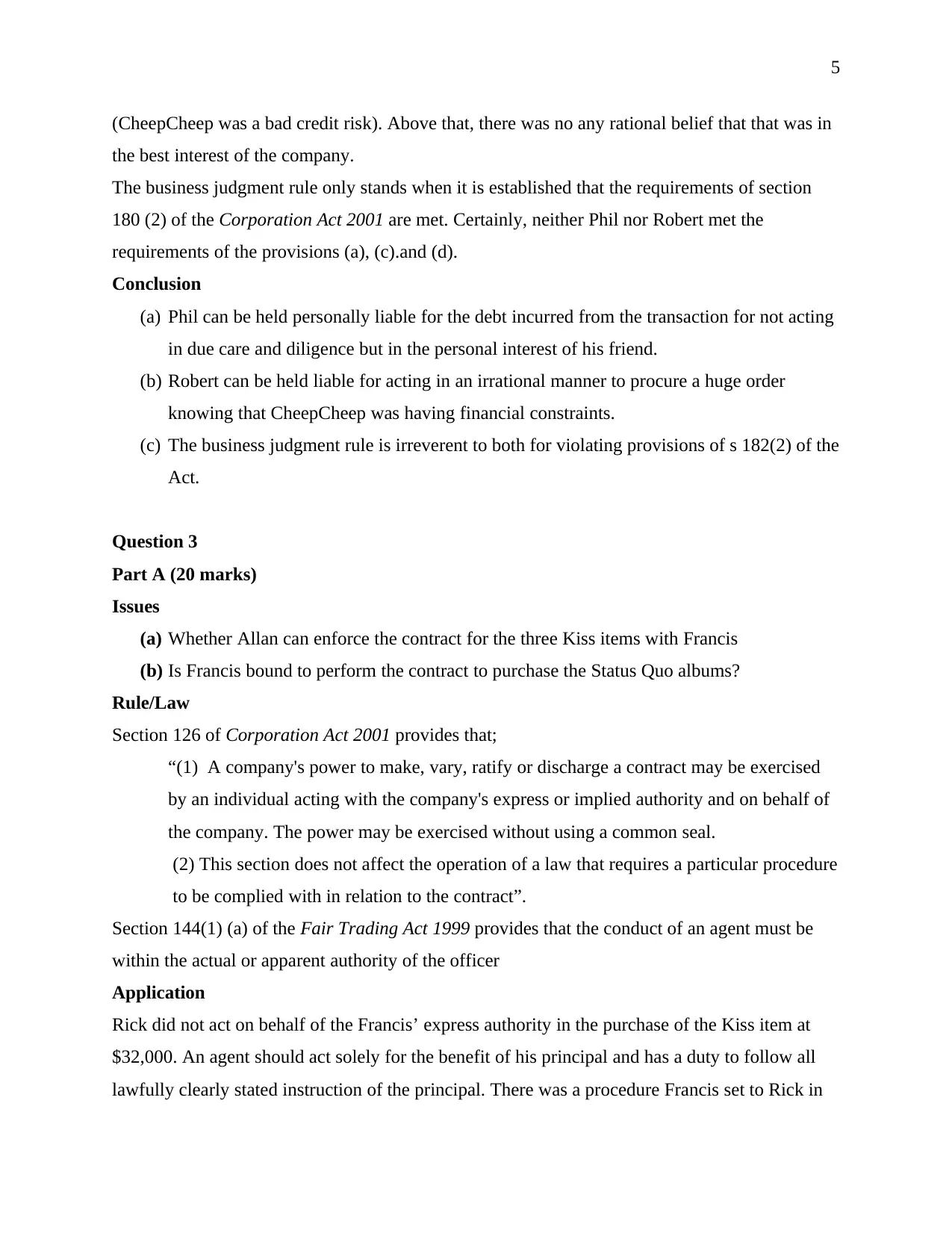
5
(CheepCheep was a bad credit risk). Above that, there was no any rational belief that that was in
the best interest of the company.
The business judgment rule only stands when it is established that the requirements of section
180 (2) of the Corporation Act 2001 are met. Certainly, neither Phil nor Robert met the
requirements of the provisions (a), (c).and (d).
Conclusion
(a) Phil can be held personally liable for the debt incurred from the transaction for not acting
in due care and diligence but in the personal interest of his friend.
(b) Robert can be held liable for acting in an irrational manner to procure a huge order
knowing that CheepCheep was having financial constraints.
(c) The business judgment rule is irreverent to both for violating provisions of s 182(2) of the
Act.
Question 3
Part A (20 marks)
Issues
(a) Whether Allan can enforce the contract for the three Kiss items with Francis
(b) Is Francis bound to perform the contract to purchase the Status Quo albums?
Rule/Law
Section 126 of Corporation Act 2001 provides that;
“(1) A company's power to make, vary, ratify or discharge a contract may be exercised
by an individual acting with the company's express or implied authority and on behalf of
the company. The power may be exercised without using a common seal.
(2) This section does not affect the operation of a law that requires a particular procedure
to be complied with in relation to the contract”.
Section 144(1) (a) of the Fair Trading Act 1999 provides that the conduct of an agent must be
within the actual or apparent authority of the officer
Application
Rick did not act on behalf of the Francis’ express authority in the purchase of the Kiss item at
$32,000. An agent should act solely for the benefit of his principal and has a duty to follow all
lawfully clearly stated instruction of the principal. There was a procedure Francis set to Rick in
(CheepCheep was a bad credit risk). Above that, there was no any rational belief that that was in
the best interest of the company.
The business judgment rule only stands when it is established that the requirements of section
180 (2) of the Corporation Act 2001 are met. Certainly, neither Phil nor Robert met the
requirements of the provisions (a), (c).and (d).
Conclusion
(a) Phil can be held personally liable for the debt incurred from the transaction for not acting
in due care and diligence but in the personal interest of his friend.
(b) Robert can be held liable for acting in an irrational manner to procure a huge order
knowing that CheepCheep was having financial constraints.
(c) The business judgment rule is irreverent to both for violating provisions of s 182(2) of the
Act.
Question 3
Part A (20 marks)
Issues
(a) Whether Allan can enforce the contract for the three Kiss items with Francis
(b) Is Francis bound to perform the contract to purchase the Status Quo albums?
Rule/Law
Section 126 of Corporation Act 2001 provides that;
“(1) A company's power to make, vary, ratify or discharge a contract may be exercised
by an individual acting with the company's express or implied authority and on behalf of
the company. The power may be exercised without using a common seal.
(2) This section does not affect the operation of a law that requires a particular procedure
to be complied with in relation to the contract”.
Section 144(1) (a) of the Fair Trading Act 1999 provides that the conduct of an agent must be
within the actual or apparent authority of the officer
Application
Rick did not act on behalf of the Francis’ express authority in the purchase of the Kiss item at
$32,000. An agent should act solely for the benefit of his principal and has a duty to follow all
lawfully clearly stated instruction of the principal. There was a procedure Francis set to Rick in
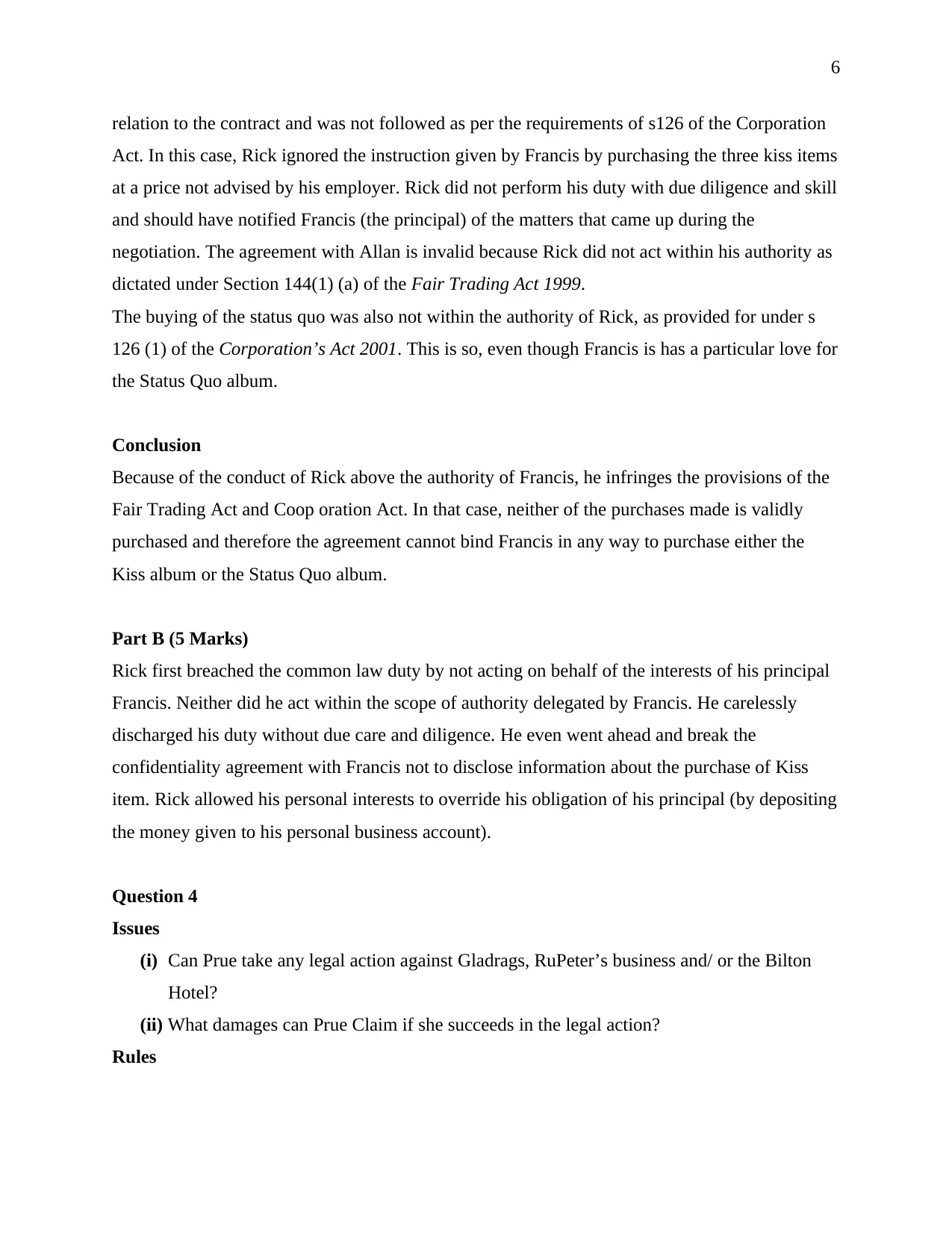
6
relation to the contract and was not followed as per the requirements of s126 of the Corporation
Act. In this case, Rick ignored the instruction given by Francis by purchasing the three kiss items
at a price not advised by his employer. Rick did not perform his duty with due diligence and skill
and should have notified Francis (the principal) of the matters that came up during the
negotiation. The agreement with Allan is invalid because Rick did not act within his authority as
dictated under Section 144(1) (a) of the Fair Trading Act 1999.
The buying of the status quo was also not within the authority of Rick, as provided for under s
126 (1) of the Corporation’s Act 2001. This is so, even though Francis is has a particular love for
the Status Quo album.
Conclusion
Because of the conduct of Rick above the authority of Francis, he infringes the provisions of the
Fair Trading Act and Coop oration Act. In that case, neither of the purchases made is validly
purchased and therefore the agreement cannot bind Francis in any way to purchase either the
Kiss album or the Status Quo album.
Part B (5 Marks)
Rick first breached the common law duty by not acting on behalf of the interests of his principal
Francis. Neither did he act within the scope of authority delegated by Francis. He carelessly
discharged his duty without due care and diligence. He even went ahead and break the
confidentiality agreement with Francis not to disclose information about the purchase of Kiss
item. Rick allowed his personal interests to override his obligation of his principal (by depositing
the money given to his personal business account).
Question 4
Issues
(i) Can Prue take any legal action against Gladrags, RuPeter’s business and/ or the Bilton
Hotel?
(ii) What damages can Prue Claim if she succeeds in the legal action?
Rules
relation to the contract and was not followed as per the requirements of s126 of the Corporation
Act. In this case, Rick ignored the instruction given by Francis by purchasing the three kiss items
at a price not advised by his employer. Rick did not perform his duty with due diligence and skill
and should have notified Francis (the principal) of the matters that came up during the
negotiation. The agreement with Allan is invalid because Rick did not act within his authority as
dictated under Section 144(1) (a) of the Fair Trading Act 1999.
The buying of the status quo was also not within the authority of Rick, as provided for under s
126 (1) of the Corporation’s Act 2001. This is so, even though Francis is has a particular love for
the Status Quo album.
Conclusion
Because of the conduct of Rick above the authority of Francis, he infringes the provisions of the
Fair Trading Act and Coop oration Act. In that case, neither of the purchases made is validly
purchased and therefore the agreement cannot bind Francis in any way to purchase either the
Kiss album or the Status Quo album.
Part B (5 Marks)
Rick first breached the common law duty by not acting on behalf of the interests of his principal
Francis. Neither did he act within the scope of authority delegated by Francis. He carelessly
discharged his duty without due care and diligence. He even went ahead and break the
confidentiality agreement with Francis not to disclose information about the purchase of Kiss
item. Rick allowed his personal interests to override his obligation of his principal (by depositing
the money given to his personal business account).
Question 4
Issues
(i) Can Prue take any legal action against Gladrags, RuPeter’s business and/ or the Bilton
Hotel?
(ii) What damages can Prue Claim if she succeeds in the legal action?
Rules
⊘ This is a preview!⊘
Do you want full access?
Subscribe today to unlock all pages.

Trusted by 1+ million students worldwide
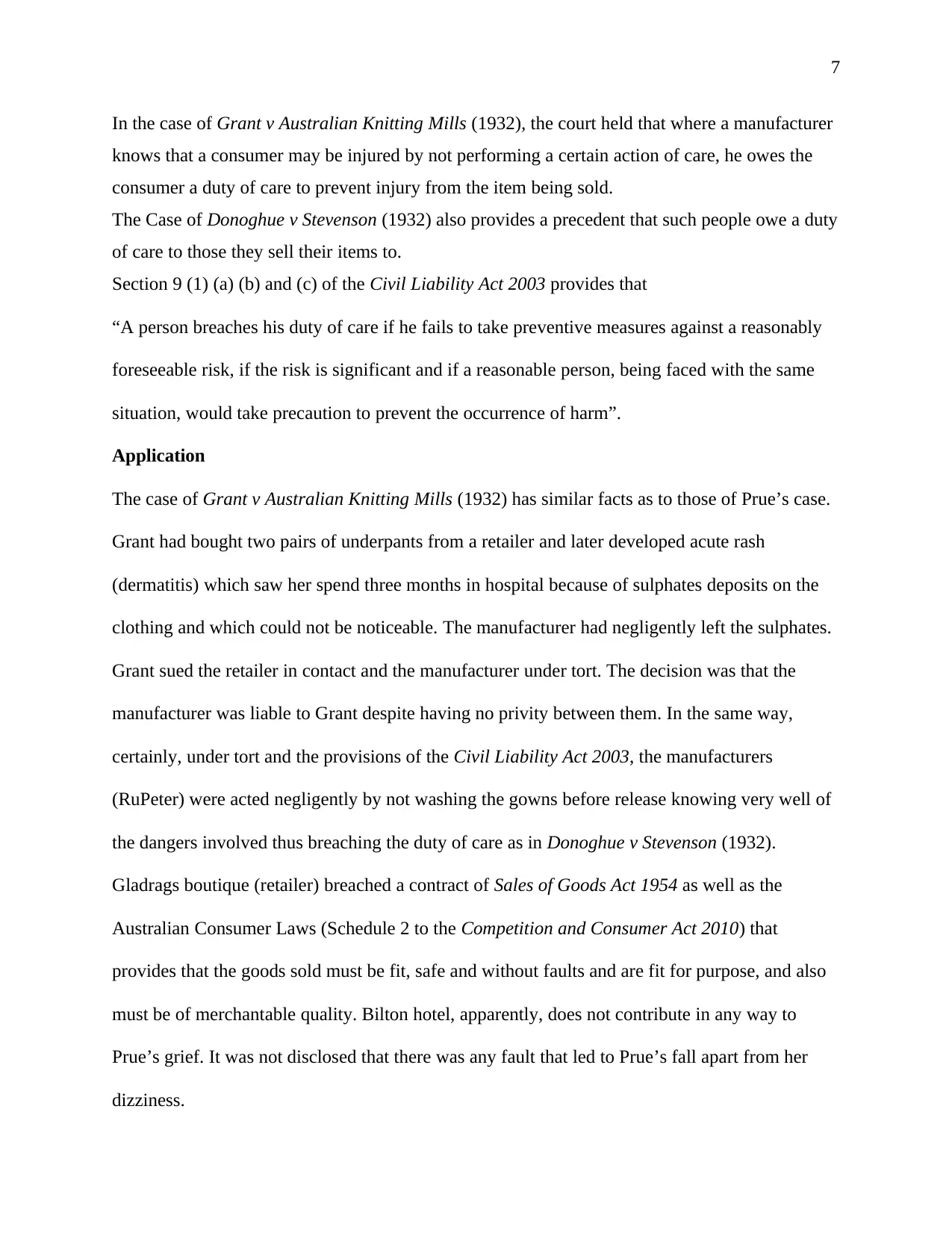
7
In the case of Grant v Australian Knitting Mills (1932), the court held that where a manufacturer
knows that a consumer may be injured by not performing a certain action of care, he owes the
consumer a duty of care to prevent injury from the item being sold.
The Case of Donoghue v Stevenson (1932) also provides a precedent that such people owe a duty
of care to those they sell their items to.
Section 9 (1) (a) (b) and (c) of the Civil Liability Act 2003 provides that
“A person breaches his duty of care if he fails to take preventive measures against a reasonably
foreseeable risk, if the risk is significant and if a reasonable person, being faced with the same
situation, would take precaution to prevent the occurrence of harm”.
Application
The case of Grant v Australian Knitting Mills (1932) has similar facts as to those of Prue’s case.
Grant had bought two pairs of underpants from a retailer and later developed acute rash
(dermatitis) which saw her spend three months in hospital because of sulphates deposits on the
clothing and which could not be noticeable. The manufacturer had negligently left the sulphates.
Grant sued the retailer in contact and the manufacturer under tort. The decision was that the
manufacturer was liable to Grant despite having no privity between them. In the same way,
certainly, under tort and the provisions of the Civil Liability Act 2003, the manufacturers
(RuPeter) were acted negligently by not washing the gowns before release knowing very well of
the dangers involved thus breaching the duty of care as in Donoghue v Stevenson (1932).
Gladrags boutique (retailer) breached a contract of Sales of Goods Act 1954 as well as the
Australian Consumer Laws (Schedule 2 to the Competition and Consumer Act 2010) that
provides that the goods sold must be fit, safe and without faults and are fit for purpose, and also
must be of merchantable quality. Bilton hotel, apparently, does not contribute in any way to
Prue’s grief. It was not disclosed that there was any fault that led to Prue’s fall apart from her
dizziness.
In the case of Grant v Australian Knitting Mills (1932), the court held that where a manufacturer
knows that a consumer may be injured by not performing a certain action of care, he owes the
consumer a duty of care to prevent injury from the item being sold.
The Case of Donoghue v Stevenson (1932) also provides a precedent that such people owe a duty
of care to those they sell their items to.
Section 9 (1) (a) (b) and (c) of the Civil Liability Act 2003 provides that
“A person breaches his duty of care if he fails to take preventive measures against a reasonably
foreseeable risk, if the risk is significant and if a reasonable person, being faced with the same
situation, would take precaution to prevent the occurrence of harm”.
Application
The case of Grant v Australian Knitting Mills (1932) has similar facts as to those of Prue’s case.
Grant had bought two pairs of underpants from a retailer and later developed acute rash
(dermatitis) which saw her spend three months in hospital because of sulphates deposits on the
clothing and which could not be noticeable. The manufacturer had negligently left the sulphates.
Grant sued the retailer in contact and the manufacturer under tort. The decision was that the
manufacturer was liable to Grant despite having no privity between them. In the same way,
certainly, under tort and the provisions of the Civil Liability Act 2003, the manufacturers
(RuPeter) were acted negligently by not washing the gowns before release knowing very well of
the dangers involved thus breaching the duty of care as in Donoghue v Stevenson (1932).
Gladrags boutique (retailer) breached a contract of Sales of Goods Act 1954 as well as the
Australian Consumer Laws (Schedule 2 to the Competition and Consumer Act 2010) that
provides that the goods sold must be fit, safe and without faults and are fit for purpose, and also
must be of merchantable quality. Bilton hotel, apparently, does not contribute in any way to
Prue’s grief. It was not disclosed that there was any fault that led to Prue’s fall apart from her
dizziness.
Paraphrase This Document
Need a fresh take? Get an instant paraphrase of this document with our AI Paraphraser
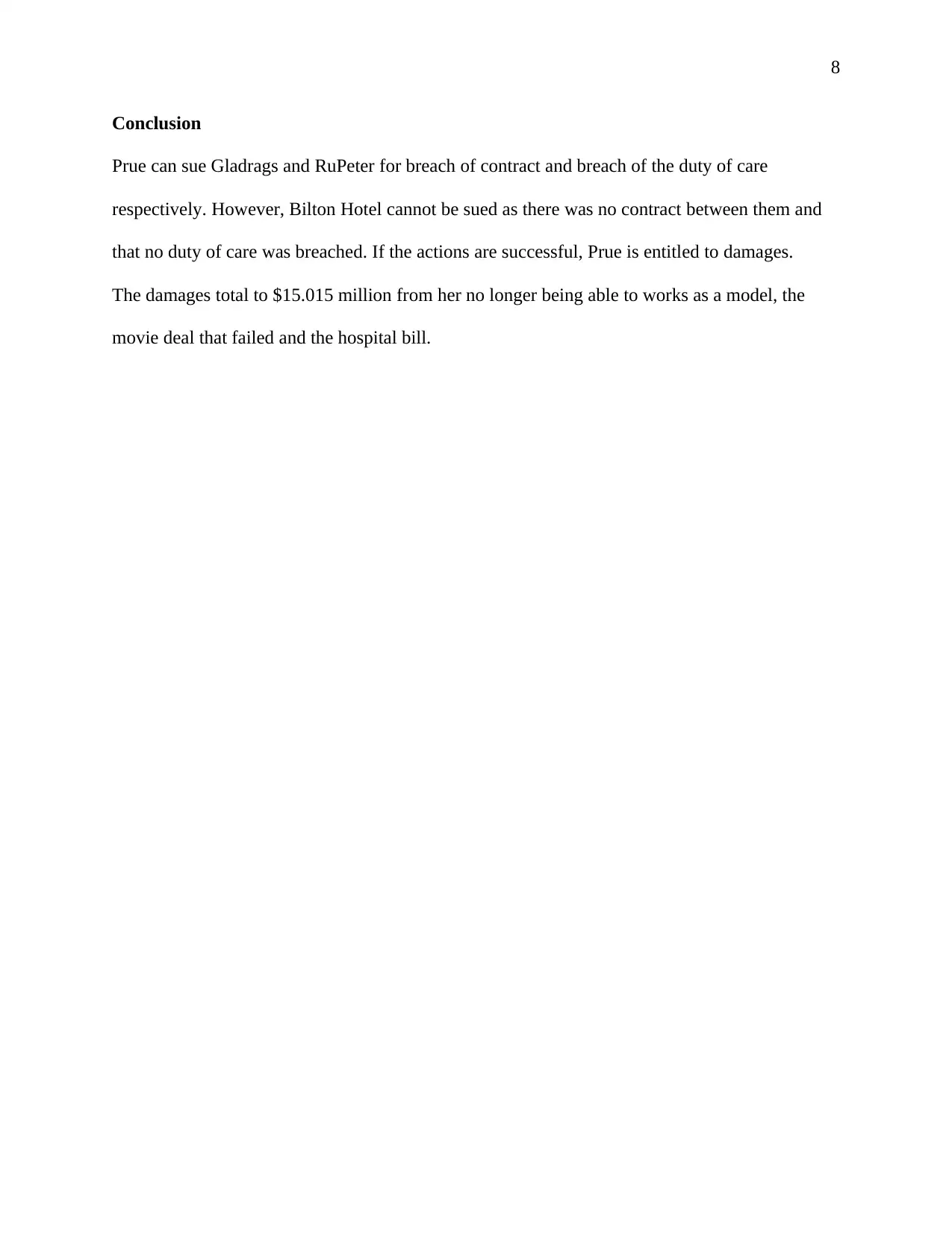
8
Conclusion
Prue can sue Gladrags and RuPeter for breach of contract and breach of the duty of care
respectively. However, Bilton Hotel cannot be sued as there was no contract between them and
that no duty of care was breached. If the actions are successful, Prue is entitled to damages.
The damages total to $15.015 million from her no longer being able to works as a model, the
movie deal that failed and the hospital bill.
Conclusion
Prue can sue Gladrags and RuPeter for breach of contract and breach of the duty of care
respectively. However, Bilton Hotel cannot be sued as there was no contract between them and
that no duty of care was breached. If the actions are successful, Prue is entitled to damages.
The damages total to $15.015 million from her no longer being able to works as a model, the
movie deal that failed and the hospital bill.
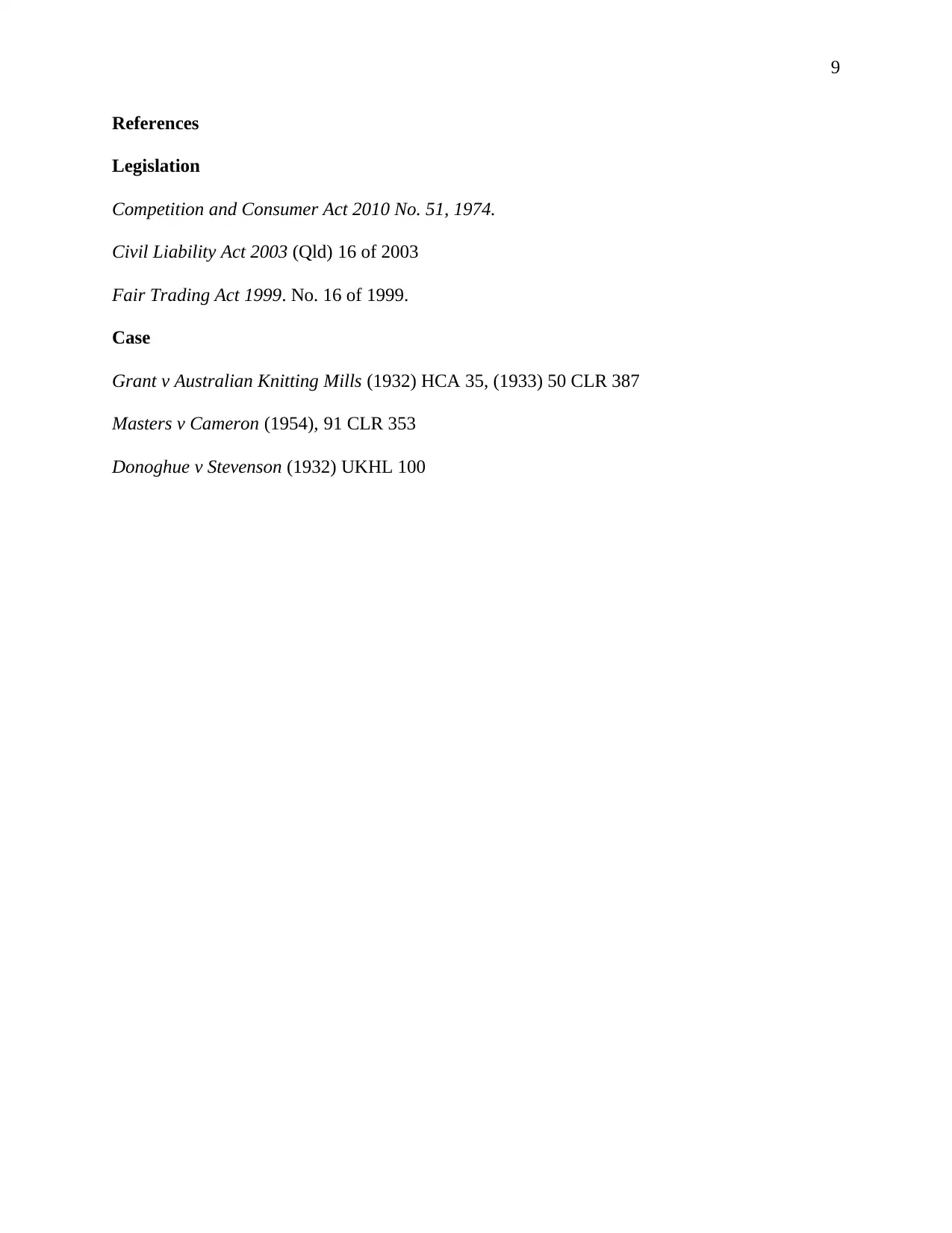
9
References
Legislation
Competition and Consumer Act 2010 No. 51, 1974.
Civil Liability Act 2003 (Qld) 16 of 2003
Fair Trading Act 1999. No. 16 of 1999.
Case
Grant v Australian Knitting Mills (1932) HCA 35, (1933) 50 CLR 387
Masters v Cameron (1954), 91 CLR 353
Donoghue v Stevenson (1932) UKHL 100
References
Legislation
Competition and Consumer Act 2010 No. 51, 1974.
Civil Liability Act 2003 (Qld) 16 of 2003
Fair Trading Act 1999. No. 16 of 1999.
Case
Grant v Australian Knitting Mills (1932) HCA 35, (1933) 50 CLR 387
Masters v Cameron (1954), 91 CLR 353
Donoghue v Stevenson (1932) UKHL 100
⊘ This is a preview!⊘
Do you want full access?
Subscribe today to unlock all pages.

Trusted by 1+ million students worldwide
1 out of 9
Related Documents
Your All-in-One AI-Powered Toolkit for Academic Success.
+13062052269
info@desklib.com
Available 24*7 on WhatsApp / Email
![[object Object]](/_next/static/media/star-bottom.7253800d.svg)
Unlock your academic potential
Copyright © 2020–2026 A2Z Services. All Rights Reserved. Developed and managed by ZUCOL.





